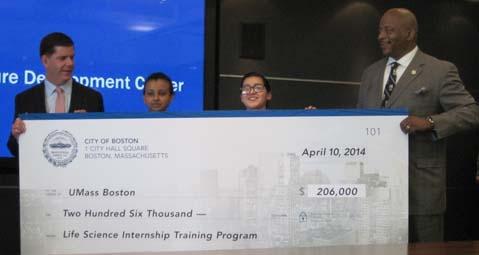April 11, 2014

UMass Boston students Bersabel Wondimagegnhu and Hembly Riva joined UMass Boston Chancellor Keith Motley and Mayor Marty Walsh during a Thursday check presentation. Photo by Jacob Aguiar
Mayor Martin Walsh celebrated his forty-seventh birthday on familiar turf: At UMass Boston’s campus, he announced a $206,000 grant to university’s Venture Development Center and the completion of a research report on Boston’s growing elderly population.
The grant is part of a 4-year grant from the U.S. Department of Labor administered through the Mayor’s office of jobs and community service. The $206,000 will fund the Life Science Internship Training Program, focused on preparing students at UMass Boston and other state and community colleges for paid internship opportunities in the Life Sciences industry.
“Too often we think that once we get our students into college their future is assured,” Walsh said at the Venture Development Center, which was once a school cafeteria. “That is not the case. We need to create pathways that reach all the way to the workplace.”
The program is based on a workshop taught developed and taught by VDC Director William Brah. The grant will enable an in-person workshop to be developed into an online course, making it available to students from all over the metropolitan area. The course is focused on helping students connect with Life Science industry start-up companies.
Searching for work at start up company is unlike a conventional job search, Brah said.
“Start-up companies rely on networking and referrals. The course is designed to help student learn how to present themselves and their work to these companies and get into their networks. We have had a good track record having placed 150 UMass Boston students in faced paced start-ups. The grant will enable us to help even more students.”
The program is partnered with the Massachusetts Life Sciences Center’s (MLSC) internship program. The MLSC is a quasi-public agency of the Commonwealth of Massachusetts tasked with implementing a 10-year, $1-billion initiative that was signed into law by Gov. Deval Patrick in 2008. The MLSC’s internship program connects Massachusetts students with Life Science employers operating in Massachusetts. The companies are reimbursed for their intern’s salary by the MLSC.
“Students are required to post their resume on the MLSC website,” said Brah. “But the companies range in size and there are thousands of resumes posted on the site. We have identified 160 faced paced start-ups in Boston that have received venture capital and are looking to hire that are not searching the MLSC site. What we have done is begun reaching out to those companies and asking them to look for our students on the site; but really the course is about connecting students to growing start-ups in the life
science industry and preparing them to work there.”
Fifty students from 5 different schools have already applied for the course, which is free and available to all two or four year science, engineering, or business majors.
Two UMass Boston students and interns through the MLSC Internship program, Bersabel Wondimagegnhu and Hembly Rivas, alongside UMass Boston Chancellor Keith Motley, accepted the grant on behalf the many students that will enroll in the training programs.
Separately, after the presentation at the Venture Development Center, Walsh walked across the Columbia Point campus to the Ryan Lounge, announcing the completion of “Aging in Boston,” a research report commissioned by Mayor Walsh and conducted by the Center for Social and Demographic Research on Aging Gerontology Institute in conjunction with City of Boston’s Commission on Affairs of the Elderly.
“We want to enhance the quality of life for older Bostonians,” Walsh said. “The only way to do that is to understand what their needs are and how they live. With this report we have detailed data on the aging population of our city.”
The report finds that by the year 2030, persons over 60 years old will make up one-fifth of Boston’s total population. It also demonstrates a growing diversity in the elderly population. “This report gives us the knowledge we need to plan for this growth and better serve our aging population,” Walsh said.
Walsh also encouraged public service agencies of all kinds to examine the data collected in the report, “Everyone planning for the future of Boston needs to learn about its population. By working together we can find solutions that best serve all of our residents.”
Boston will be one of the first cities join the World Health Organization’s age friendly City Network. “This will help us create an action plan so we will be able to take decisive steps to make Boston a better place for older people to live,” Walsh said.
Villages:
Topics:


